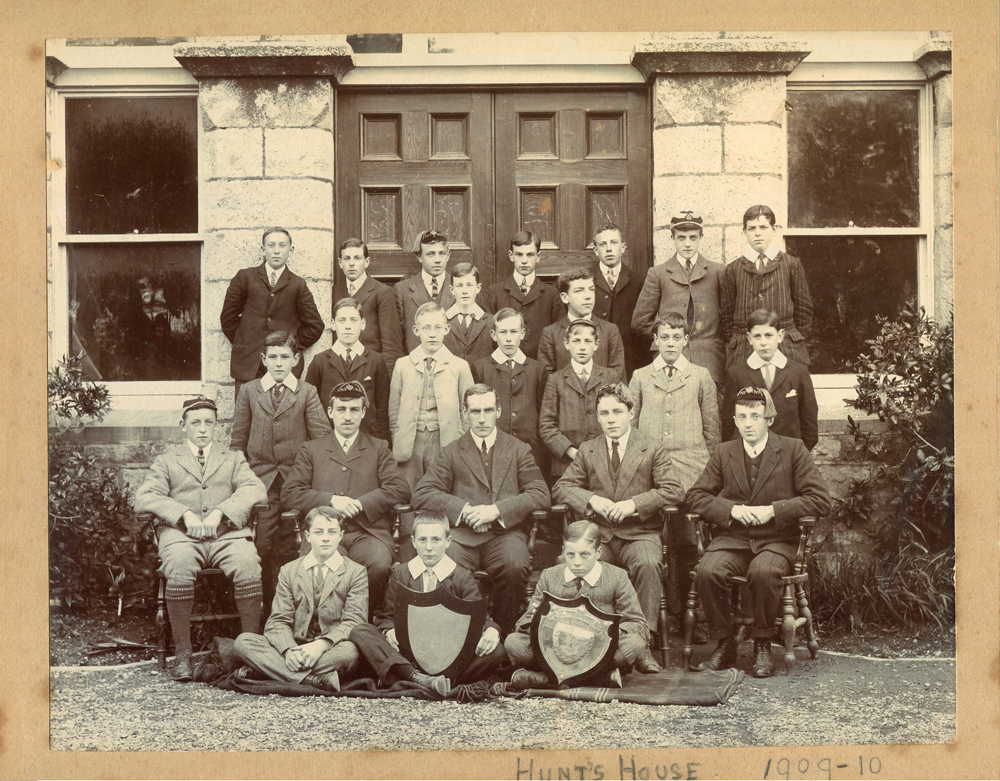
- 7 clarence grove
- horsforth
- leeds, LS18 4LA
- UK
- tel: 0113 258 1300
- order online
- www.editiondb.com
- info@editiondb.com
- Back to catalogue
- Back to biography
- Recordings
- List of works
- Auto-biographical note
- Performances
- Memoirs
- Reviews
P-G's school days
Humphrey Procter-Gregg went to King William's College on the Isle of Man in January 1907 aged eleven. His younger brother Myles* joined at the same time. Their parents took the lease of Lorne House in Castletown (and later of Westham, Castletown), in order that the boys could attend the college as Day Boys. They were both in Hunt House which was simply known then as the Day Boys' House.
Music, especially the Chapel Choir, but also instrumental music - there was an orchestra - was flourishing, and had developed over many years under Miss Edith McKnight, the Director of Music (one of the first to be appointed to such a post in any school), who was a very distinguished pianist and organist. She gave numerous organ recitals in England. P-G worked especially closely with Miss McKnight in his final year (1913-14), when he was the senior student musician.
He is mentioned as a performer in school concerts, and he was a leading member of the chapel choir. In 1913 he composed the music for a new school song, 'Insulae Collegium', the words by A.R. Sugden, a teacher, and this was performed to acclaim in a school concert in the summer of 1913. It became immediately popular with the students and was printed (sadly the school doesn't have a copy of the full score, but the melody line and words survive). At this same concert a song 'Night Song', with words and music by Humphrey, was performed - Humphrey accompanied the soloist on the piano.
In addition to his music, in his final year Humphrey was a Praepositor (Prefect) and Head of School. He also edited 'The Barrovian', the school magazine. He also served in the Officer Training Corps (now the modern day Army Cadet Corps). In 1914 all independent schools had them and it was from the OTCs that young officers were quickly trained to serve in the army/navy in the First World War.
He went up to Peterhouse, Cambridge in 1914 on a Kelly Scholarship (one of many scholarships awarded by King William's College on the school foundation to assist scholars to attend university) - to read History. His music continued to develop significantly, and in 1920 he gained his B.Mus at Cambridge. From Cambridge he went to the Royal College of Music: in 1922 he was awarded the Wesley Exhibition for Improvisation, and in 1923 he won a RCM Travelling Scholarship. His subsequent career and achievements in Manchester are well known.
___________
* Myles, Humphrey's younger brother, was born 17 July 1896, and entered KWC in January 1907 (both boys came together) and left in July 1914. In the First World War in 1915 he was 2nd Lieutenant in the Loyal North Lancashire Regiment. He transferred to the fledgling RAF - he was a Captain in 1918. He served in the Mediterranean in 1918-19 - crashed in February 1919 but survived. His subsequent career was in aviation. He joined the Bristol Aeroplane Company and was with them until 1945. He then joined Rolls Royce from 1945. He died 18 August 1961. There is an obituary in the 'Barrovian' magazine.
(Edition db is indebted to Michael Hoy and Rebecca Macnair on the IOM for the above information)

Photo by courtesy of King William's College
__________________________________________________________________________________________
Several of Humphrey Procter-Gregg's compositions have been recorded on the Dutton Epoch label.
Clarinet Concerto on Dutton CDLX 7153 - Ian Scott (clarinet) and the Royal Ballet Sinfonia conducted by Barry Wordsworth. CD Review
Sonata No.3 for violin and piano on Dutton CDLX 7165 - Richard Howarth (violin) and Ian Buckle (piano)
Sonata for clarinet and piano on Dutton CDLX 7165 - Nicholas Cox (clarinet) and Ian Buckle (piano)
Sonata for horn and piano on Dutton CDLX 7165 - Bob Ashworth (horn) and Ian Buckle (piano)
Westmoreland Sketches (Nos.23-26) on Dutton CDLX 7165 - Ian Buckle (piano)
- Back to catalogue
- Back to biography
- Recordings
- List of works
- Auto-biographical note
- Performances
- Memoirs